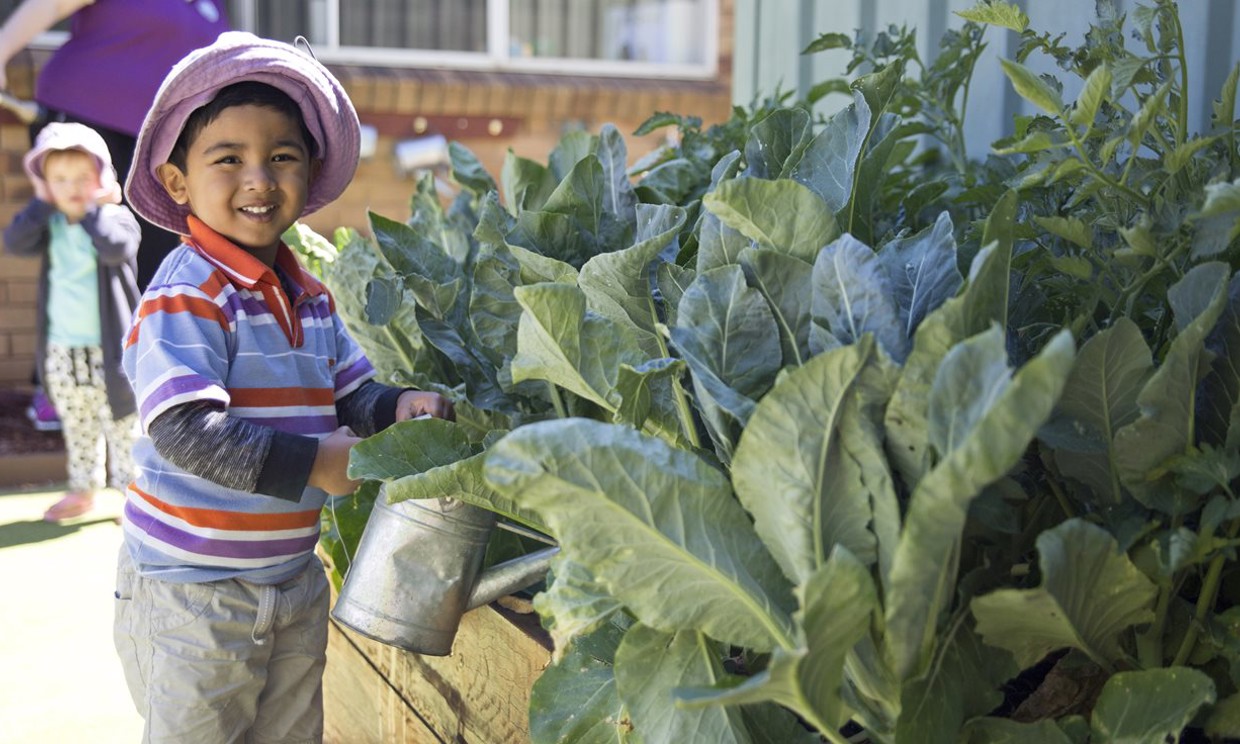If your child is playing, they can’t be learning, right? In fact, children learn a huge number of different skills through play. It allows them to explore, discover, negotiate, take risks, create meaning and solve problems – all of which help develop literacy, numeracy and social skills.
Through play-based learning, skilled educators can introduce the concepts we want children to learn in a way that engages with the child’s interests.
Play-based learning draws on a child’s natural sense of enquiry and provides a hands-on exploration of the world around them.
Play-based learning is a complex form of natural enquiry. Adding intentional learning outcomes to play requires an experienced educator who knows each child’s overall development, strengths and interests.
Educators embed elements of teaching and learning within play experiences that children are naturally drawn to. Here’s an example of what play based learning would look like for a group of children around a centre’s vegetable patch:
“When parents give their child a puzzle to do, it’s a chance to interact and have fun. For early-childhood educators, it’s a chance to explore educational concepts such as pattern-matching, problem-solving, numerical and mathematical concepts, and language skills.”

We recognise that children are active learners who learn naturally through exploration – by touching, moving, listening, seeing and experiencing. Equally, we know that children are individuals and have many different interests.
Experienced educators record each child’s experiences, observations, ideas and creative expressions and use this information to build a rich and individual learning program. These programs include activities as individuals, one on one with an educator, and in small and large groups.
Play based learning is central to the Australian Government’s Early Years Learning Framework (EYLF), the national framework for early education. While it may look simple on the surface, there’s a lot of work that goes on in the background to ensure each child is interested, engaged and getting the learning outcomes they need for school and life.
If you’d like to learn more about our approach to play based learning, talk to us today or visit a centre near you.
Through play-based learning, skilled educators can introduce the concepts we want children to learn in a way that engages with the child’s interests.
Play comes naturally, we add the learning
Play-based learning draws on a child’s natural sense of enquiry and provides a hands-on exploration of the world around them.Play-based learning is a complex form of natural enquiry. Adding intentional learning outcomes to play requires an experienced educator who knows each child’s overall development, strengths and interests.
What does play based learning look like?
Educators embed elements of teaching and learning within play experiences that children are naturally drawn to. Here’s an example of what play based learning would look like for a group of children around a centre’s vegetable patch:
- One group will be encouraged to chart how the vegie patch has changed in recent weeks
- Another group are encouraged to write or draw a menu for a pretend restaurant including the food being grown in the garden
- A third group would learn how to detect which vegetables are ready for harvest
“When parents give their child a puzzle to do, it’s a chance to interact and have fun. For early-childhood educators, it’s a chance to explore educational concepts such as pattern-matching, problem-solving, numerical and mathematical concepts, and language skills.”

Is it the same for each child?
We recognise that children are active learners who learn naturally through exploration – by touching, moving, listening, seeing and experiencing. Equally, we know that children are individuals and have many different interests.Experienced educators record each child’s experiences, observations, ideas and creative expressions and use this information to build a rich and individual learning program. These programs include activities as individuals, one on one with an educator, and in small and large groups.
Play based learning is central to the Australian Government’s Early Years Learning Framework (EYLF), the national framework for early education. While it may look simple on the surface, there’s a lot of work that goes on in the background to ensure each child is interested, engaged and getting the learning outcomes they need for school and life.
If you’d like to learn more about our approach to play based learning, talk to us today or visit a centre near you.


